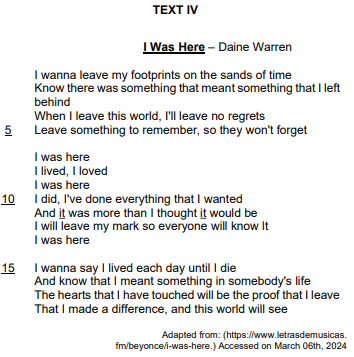Questões Militares
Foram encontradas 223 questões
Resolva questões gratuitamente!
Junte-se a mais de 4 milhões de concurseiros!
Sergeant Brooks: Can you tell me _____ you last saw Private Johnson?
Corporal Diaz: I last saw him in Colonel Grant’s office.
Sergeant Brooks: _____ did you see him exactly?
Corporal Diaz: Five minutes before lunch break.
Sergeant Brooks: And _____ was he doing there?
Corporal Diaz: He was repairing the colonel’s computer.
Sergeant Brooks: _____ was he with?
Corporal Diaz: Nobody. He was alone.
Sergeant Brooks: _____ did you go to the Colonel’s Office?
Corporal Diaz: Because I had to take documents to Colonel Grant before he left for lunch.
When Johnny comes marching home By Patrick Sarsfield Gilmore
When Johnny comes marching home again Hurrah! Hurrah!
We’ll give him a hearty welcome then Hurrah! Hurrah!
The men will cheer and the boys will shout The ladies they will all turn out
[…]
Disponível em https://www.battlefields.org/learn/primary-sources/civil-war-music-when-johnny-comes-marching-home-again. Acesso em 22 de dezembro de 2022.
Read the song and choose the correct answer.
I Blood product transfusion from infected donors can transmit the disease.
II The also called kissing bug’s feces and urine carry the protozoan parasite.
III Infected pregnant women cannot contaminate their babies during pregnancy or childbirth.
IV Contaminated food or drinks can transmit Chagas disease to people.
Choose the correct option.
